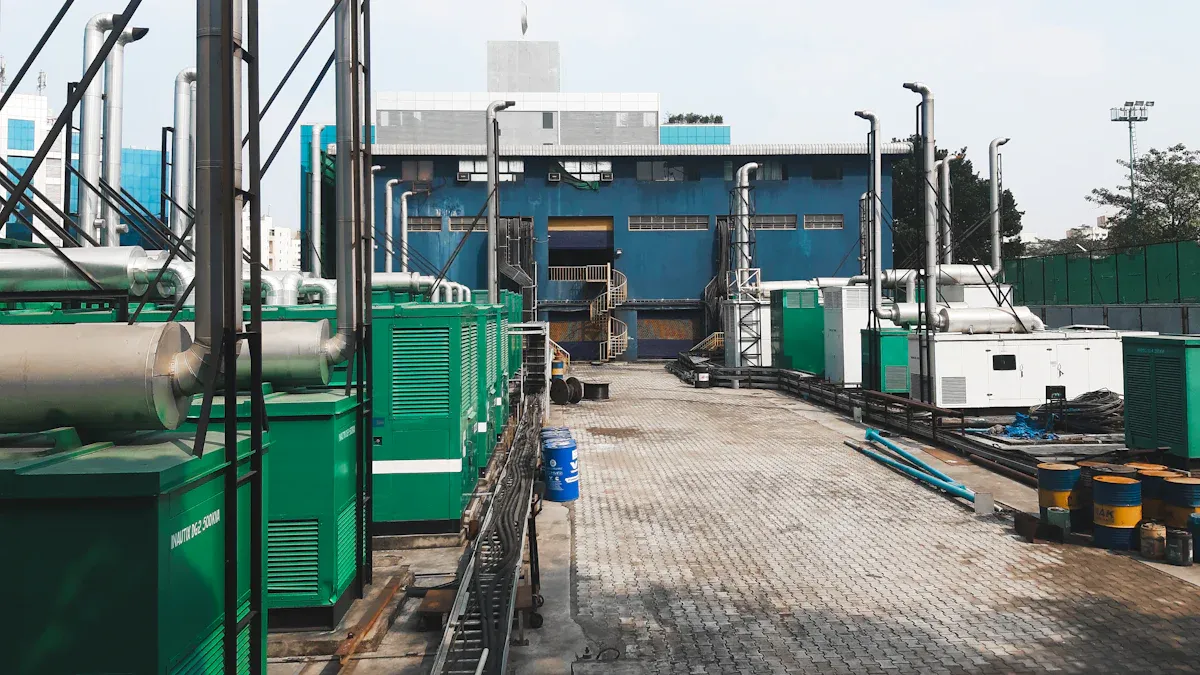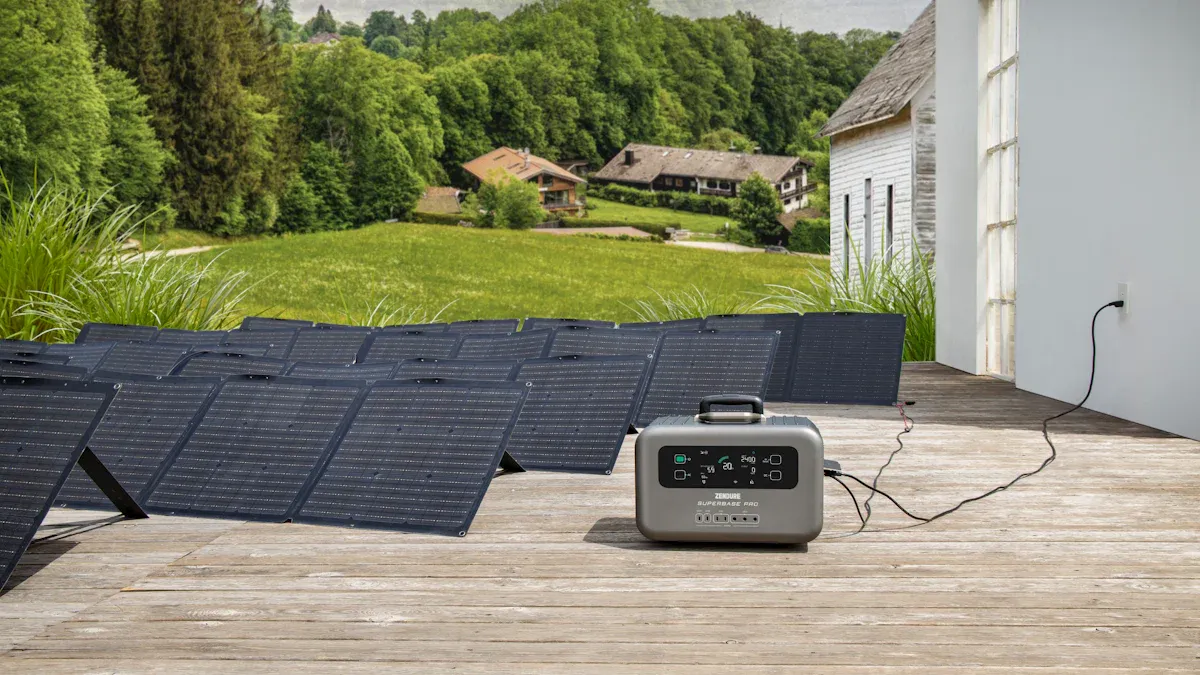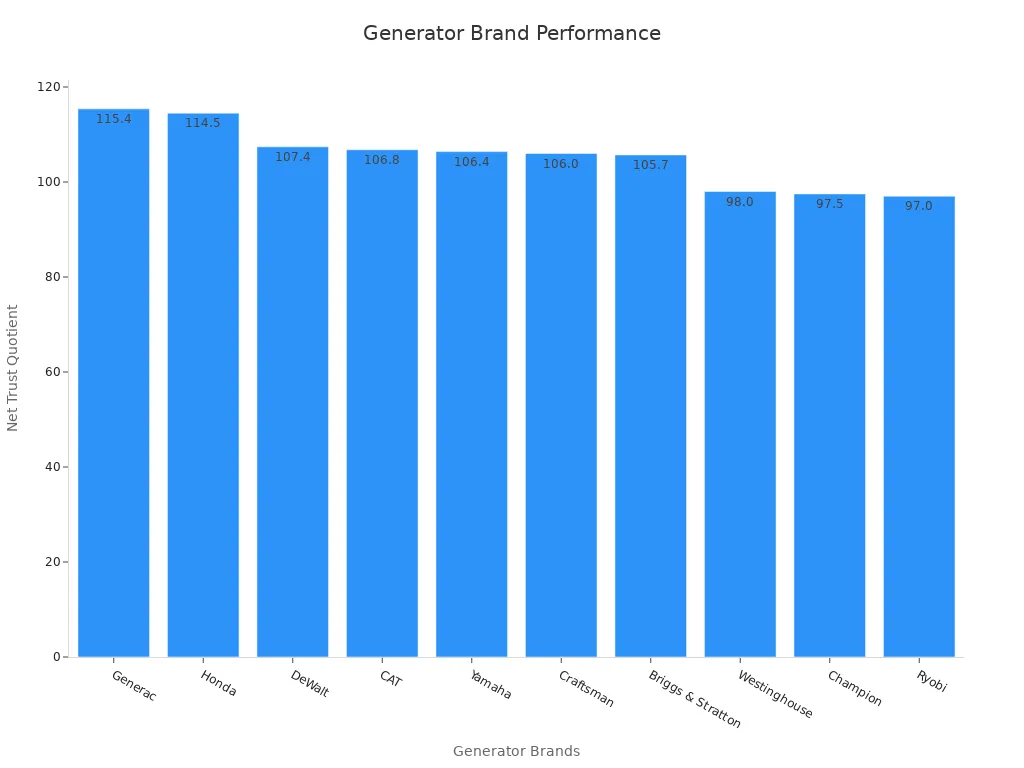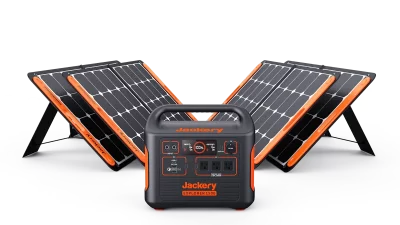
When you buy a used generator, start by checking the seller’s reputation and the equipment’s maintenance history. Always inspect the machine and run a test before making a decision. Good maintenance matters: poorly maintained emergency diesel generators have a 50% chance of failing in 48 hours, while well-maintained ones drop to 20% over two weeks. Look at the table below to see how generator type and placement can save money:
Generator Type | Penetration Level | Location (Bus) | Minimum Money Loss (USD) |
|---|---|---|---|
Solar Power | 50% | Bus 4 | 743.90 |
Wind Power | 25% | Bus 4 | 999.00 |
Hydropower | 75% | Bus 4 | 546.50 |
Stay informed and careful to avoid common mistakes.
Principales conclusiones
Check the seller’s reputation and maintenance history before buying a used generator to avoid problems later.
Know your power needs by adding running and starting wattages of your devices, then choose a generator that meets or exceeds this total.
Inspect the generator carefully for signs of wear, leaks, missing parts, and ask for service records to confirm good maintenance.
Test the generator by running it cold, checking its power output, and if possible, perform a load bank test to ensure reliability.
Ask the seller important questions about the reason for sale, service history, and warranty, and always complete proper paperwork to protect your purchase.
Necesidades de energía
Wattage
Choosing the right generator starts with knowing how much power you need. Every device in your home uses a certain amount of electricity, measured in watts. Some appliances, like refrigerators or air conditioners, need extra power to start up. This is called starting wattage. After they start, they use less power, known as running wattage. If you ignore starting wattage, your generator might trip a breaker or fail to start your devices.
Here is a table to help you understand typical wattage needs for different uses:
Application | Typical Wattage Range (Watts) | Description and Use Case |
|---|---|---|
Essential Home Appliances | 3,000 | Powers critical appliances like refrigerators, lighting, and communication devices during outages. |
Most Households | 5,000 – 8,000 | Supports multiple essential systems including refrigeration, heating/cooling, sump pumps, and lighting. |
Larger Homes / Extensive Needs | 12,000 – 20,000 | Runs large appliances such as electric ranges, multiple air conditioners, water heaters, etc. |
RV Use | 2,000 – 4,000 | Powers cooking appliances, entertainment, and charging devices while traveling. |
Camping / Tailgating | 1,600 – 2,200 | Provides power for portable electronics and small cooking equipment in outdoor settings. |
Consejo: Add up the running watts for all devices you want to use at the same time. Then, add the highest starting wattage from any single device. For safety, include a 20–30% buffer to handle power surges or future needs.
Usage
Think about how you plan to use your generator. If you only need to keep your refrigerator, a few lights, and your phone charged during a power outage, a 3,000-watt generator may be enough. If you want to run your air conditioner, sump pump, and several appliances at once, you might need a generator in the 5,000 to 8,000-watt range. For large homes or heavy use, look for models with 12,000 watts or more.
You should also consider where you will use your generator. For camping or tailgating, a small, quiet generator works best. For home backup, choose a model that can handle your most important appliances. Always check the wattage labels on your devices and make a list before you shop. This helps you avoid buying a generator that is too small or too large for your needs.
Where to Buy

Choosing the right place to buy a used generator can make a big difference in your experience. You want to feel confident that your purchase is safe and reliable. Here are the main options you can consider:
Dealers
You can start by visiting certified or reputable dealers. These businesses often inspect and service their generators before selling them. Dealers usually offer some form of warranty or return policy. This gives you extra peace of mind. Many buyers trust dealers because they have a reputation to protect. You should ask for maintenance records and check if the dealer has any customer testimonials. A good dealer will answer your questions and let you inspect the generator closely.
Online
Shopping online gives you access to a wide range of used generators. You can compare prices, brands, and features from the comfort of your home. Before you buy, always check reviews and ratings. Most people trust online reviews as much as personal recommendations. In fact:
93% of shoppers read reviews before making a purchase.
58% are willing to pay more or travel further for companies with good reviews.
95% read customer reviews before buying from unknown online shops.
You should look for sellers with high ratings and a mix of positive and negative feedback. Photos and videos from other customers can help you feel more confident. If you see mostly negative reviews or very low ratings, it is best to look elsewhere.
Local Ads
You might find good deals in local ads, such as newspapers or community boards. This option lets you see the generator in person before you buy. Always meet in a safe place and bring someone with you if possible. Ask the seller why they are selling the generator and request any service records. Be careful with deals that seem too good to be true. Trust your instincts and do not rush into a purchase.
Consejo: No matter where you shop, take your time to research the seller and the generator. A little extra effort can save you money and trouble later.
Inspecting a Used Generator

Condición
Start your inspection by looking at the physical condition of the used generator. Check for rust, dents, or cracks on the frame and panels. Open the access panels and look for oil leaks, dirty filters, or loose wires. A clean generator often means the owner took care of it. Dirty or oily parts can signal neglect or hidden problems.
Visual inspection is a key step in finding issues early. Experts in the industry use visual checks to spot wear, corrosion, and cracks. These problems can cause the generator to fail. By catching them early, you can avoid costly repairs and keep your generator running longer. Look for signs like loose windings, corrosion, or broken parts. If you see any of these, ask the seller for more details or consider another option.
Consejo: Bring a flashlight and a clean rag. Wipe away dirt to see the true condition of the parts.
Age & Hours
The age and hours of use tell you how much life the generator has left. Most whole-home generators last about 10,000 hours or 5 to 10 years. Portable generators can last up to 10 years if you take care of them. Always check the hour meter on the generator. If the meter looks tampered with, ask for service records to confirm the number.
Here is a table to help you understand what to expect:
Generator Type | Expected Lifespan |
|---|---|
Whole-home generators | |
Portable generators | Up to 10 years with proper maintenance |
You should also ask how often the generator was exercised. Regular exercise keeps the engine healthy. Look at the table below for common exercise routines:
Exercise Type | Frequency | Duration |
|---|---|---|
Without load | Weekly or monthly | 30 minutes |
With full load | Quarterly | 15-20 minutes |
If the generator is much older than these guidelines or has very high hours, it may not last much longer.
Maintenance
A well-maintained used generator will serve you better and last longer. Ask for maintenance records. These should show regular oil changes, filter replacements, and inspections. Good records prove the owner cared for the machine.
Here is a table of common maintenance intervals and tasks:
Maintenance Interval | Recommended Tasks |
|---|---|
Check hoses, meters, oil/fuel/coolant levels, fan belt, cooling system; change fuel/water separator, fuel filter, engine oil filter, and engine oil. | |
Monthly | Inspect and exercise generator under load for at least 30 minutes. |
Every 2000 hours or yearly | Change coolant; replace engine oil, fuel and coolant pipes; change filters; clean fuel tank. |
Yearly | Professional servicing recommended to identify and fix issues early. |
Nota: Maintenance should happen at the time or hour listed, whichever comes first. Skipping these steps can shorten the life of your generator.
Brand
The brand of a used generator can tell you a lot about its reliability and value. Some brands have higher ratings for performance and fewer service calls. Look at the table below to compare popular brands:
Brand | Market Share (%) | Service Call Reduction | Uptime (%) | Warranty (years) | Key Strengths | |
|---|---|---|---|---|---|---|
Kohler | 4.9/5 | 10 | 62% fewer than economy | 99.2 | 5-10 | Highest reliability, premium build quality |
Cummins | 4.8/5 | 7 | 62% fewer than economy | 98.9 | 5-10 | Superior cold-weather performance |
Generac | 4.7/5 | 70 | N/A | N/A | 5-10 | Largest market share, best dealer support |
Briggs & Stratton | 4.5/5 | 8 | N/A | N/A | 5 | Best value-to-reliability ratio |
Champion | 4.2/5 | 5 | N/A | N/A | 10 | Budget-friendly with good warranty |
You can also see how brands compare in trust scores:
Rank | Brand | Rating | |
|---|---|---|---|
1 | Generac | 115.4 | ★★★★★ |
2 | Honda | 114.5 | ★★★★★ |
3 | DeWalt | 107.4 | ☆☆☆ |
4 | CAT | 106.8 | ☆☆☆ |
5 | Yamaha | 106.4 | ☆☆☆ |
6 | Craftsman | 106.0 | ☆☆ |
7 | Briggs & Stratton | 105.7 | ☆☆ |
8 | Westinghouse | 98.0 | ☆☆ |
9 | Champion | 97.5 | ☆☆ |
10 | Ryobi | 97.0 | ☆☆ |

Choose a brand with a strong reputation and good support. This can make it easier to find parts and service in the future. Always match the brand and model to your needs and budget.
Consejo: Double-check the hour meter and compare it with the maintenance records. If the numbers do not match, ask the seller for an explanation.
Used Generator Testing
Testing a used generator before you buy it helps you avoid costly surprises. You want to know that the generator will work when you need it most. Follow these steps to check performance and reliability.
Run Test
Start with a cold engine. Ask the seller not to run the generator before you arrive. A cold start shows you how well the generator starts after sitting unused. Turn the key or press the start button. Listen for smooth cranking and quick ignition. The engine should not struggle or make loud knocking sounds. Let the generator run for at least 10–15 minutes. Watch for smoke, leaks, or warning lights. Check for steady operation and listen for unusual noises like rattling or grinding. These sounds can mean worn parts or hidden damage.
Consejo: Always test the generator in a well-ventilated area. Never run it indoors.
Output Check
Once the generator runs smoothly, check the power output. Use a multimeter to measure the voltage at the outlets. The reading should match the generator’s rated output, such as 120V or 240V. Fluctuating or low voltage can signal electrical problems. Plug in a few devices, like lights or a fan, to see if the generator powers them without trouble. Watch for flickering lights or devices that do not work right. This step helps you spot issues with the alternator or voltage regulator.
A steady output means the generator can handle your needs. If you see problems, ask the seller for an explanation or consider another unit.
Load Bank
Load bank testing is the best way to see if a used generator can handle real work. A load bank connects to the generator and simulates the electrical demand of appliances and equipment. This test checks if the generator can run at its full rated load without overheating or shutting down.
Load bank testing helps you:
Confirm the generator’s ability to handle its rated load.
Identify weak parts before they cause a failure.
Prevent issues like wet stacking, which happens when diesel generators run without enough load.
Improve the generator’s lifespan and reliability.
Many experts recommend annual load bank testing for standby generators. If you use the generator for critical loads, such as in hospitals or factories, test it every six months or more often. Some rules, like those from the NFPA, require regular load testing for emergency power systems. These tests include cold starts and running the generator under different loads. The process involves careful preparation, applying loads in steps, and monitoring performance. After the test, you get a report that proves the generator meets safety and quality standards.
Nota: Load bank testing gives you proof that the generator works as promised. This is important for buyers who need reliable backup power.
A complete test with a load bank can reveal problems that a simple run test might miss. It also builds your confidence in the used generator you plan to buy.
Questions for Seller
When you find a generator that looks promising, ask the seller important questions before you buy. These questions help you avoid surprises and make sure you get a reliable machine.
Reason for Sale
Start by asking, “Why are you selling this generator?” The answer can tell you a lot. Some people sell because they upgraded or no longer need backup power. Others might sell because the generator has problems. If the seller hesitates or gives a vague answer, be careful. Honest sellers will explain their reason clearly. You want to know if the generator has a hidden issue or if it simply does not fit the seller’s needs anymore.
Service History
Ask for the complete service history. Service records show how well the generator was cared for. A generator with regular maintenance is less likely to break down. Many buyers have learned the hard way that skipping this step can lead to expensive repairs. For example:
One buyer purchased a used RV with no service records and faced many unexpected repairs, even though the RV looked fine during inspection.
Some experts suggest checking service records through VIN searches or by contacting previous owners.
Complete records, including oil changes and inspections, help you spot hidden problems. Fresh oil alone does not prove good maintenance.
Professional companies, like Rack Electric, keep detailed service reports after every visit. These records help you see if any issues were found and fixed early. Always ask for written proof of maintenance. If the seller cannot provide it, you might want to look for another generator.
Garantía
Check if the generator still has a warranty or if the seller offers a return policy. Some dealers provide short-term warranties on used equipment. Private sellers usually do not, but it never hurts to ask. A warranty gives you extra peace of mind. If the generator fails soon after purchase, you may get repairs or a replacement at no extra cost. Always read the warranty terms carefully. Make sure you understand what is covered and for how long.
Consejo: Ask if the generator has had any modifications. Changes to the original design can affect performance and safety.
Red Flags
Neglect
You should always look for signs of neglect when checking a generator. Poor maintenance can lead to expensive repairs and sudden breakdowns. If you see any of these warning signs, be careful:
Leaks or puddles under the generator
Rust spots or corrosion on metal parts
Cracked belts or frayed hoses
Dirty or clogged air filters
Strange noises or abnormal vibrations
Discolored oil or low coolant levels
Routine checks should include looking at oil color, air filters, coolant, and battery health. If you notice rust, cracks, or dripping fluids, these are big warning signs. Skipping regular maintenance can damage the unit and shorten its life. Experts recommend professional servicing every few years to catch problems early.
Nota: Neglected maintenance often means the generator will not last long or work well when you need it most.
Missing Parts
Missing or worn parts can cause a generator to fail when you need it most. Even small parts, like filters or belts, play a big role in keeping the generator running smoothly. If you see missing covers, loose wires, or broken switches, the generator may not be safe or reliable.
Missing filters, fuel lines, or belts can cause leaks, odd smells, and strange noises.
Low oil or fuel levels may point to leaks that could get worse.
Regular checks of the radiator, belts, and filters help prevent big problems.
Vibration and noise tests can show if something inside is worn out.
Look at the housing, cables, and fans for signs of wear or corrosion.
A missing automatic transfer switch can stop the generator from starting or sending power. Always check that all parts are present and in good shape.
Price Issues
Unrealistic prices are a major red flag. If a deal seems too good to be true, it probably is. Sellers who rush you or refuse to answer questions may be hiding something. Watch out for these price-related warning signs:
The price is much lower than similar models in your area
The seller will not let you inspect or test the generator
The seller pushes you to pay quickly or in cash only
The ad has little information or only stock photos
Take your time to compare prices and ask questions. Trustworthy sellers will let you check the generator and answer your questions. If you feel pressured or unsure, walk away.
Consejo: Always trust your instincts. If something feels off, it is better to keep looking.
Price & Deal
Research
Start your buying process by learning about the fair market value of the generator you want. Check prices from different sources, such as dealers, online retailers, and local sellers. Compare features, age, and condition. Look for recent sales of similar models. This helps you spot a good deal and avoid overpaying.
Consejo: Use websites like ElectricGeneratorsDirect.com and PowerEquipmentDirect.com to compare prices and see what discounts are available.
You can also check big box stores and online resellers. These sellers often offer bigger discounts than direct purchases from manufacturers. For example, online retailers may give you 10–20% off the minimum advertised price, while dealers might only offer 5–11.6% off plus shipping. Knowing these numbers gives you more power when you negotiate.
Offer
When you find a generator you like, make a confident offer. Use your research to back up your price. If you see a better deal elsewhere, mention it. Sellers often match or beat competitor prices to close a sale. You can also ask for extras, such as free shipping or a short warranty.
Dealers often negotiate more when you show you know the market.
Larger orders or bundling accessories can lead to bigger discounts.
Switching suppliers or comparing shipping costs can help you save more.
Do not be afraid to walk away if the price does not feel right. Many buyers save money by being patient and firm.
Paperwork
Always complete the paperwork before you pay. Proper documents protect you from fraud, theft, and legal problems. Ask for an invoice, a receipt, and any warranty or service records. These papers prove you own the generator and help if you need repairs later.
Nota: Secure your documents. Store them in a safe place and keep digital copies if possible.
Good paperwork prevents disputes and keeps your transaction safe. Custom agreements work best because they fit your deal and protect your rights. Never accept generic forms without checking the details.
A smart deal gives you more than just savings. You also get shorter lead times and the freedom to modify your generator as needed.
You can buy a generator with confidence when you follow these steps. Check the seller’s reputation, inspect the machine, and test it before you decide. Ask clear questions about service history and warranty. Always compare prices and review paperwork.
Remember: Careful checks help you avoid problems and get the best value. Choose trusted sources for peace of mind.
PREGUNTAS FRECUENTES
¿Cómo sé si un generador usado es fiable?
Check the maintenance records and run a test before you buy. Look for signs of regular care, like clean oil and working parts. Ask the seller about any repairs. A reliable generator starts easily and runs smoothly.
Can I use a used generator for my whole house?
You can use a used generator for your whole house if it has enough wattage. Add up the power needs of your main appliances. Choose a generator that meets or exceeds this total. Always check the generator’s rating before you buy.
What should I do if the generator has no service records?
Ask the seller for details about past maintenance. If they cannot provide records, inspect the generator carefully. Run a test and listen for odd noises. You may want to ask a technician to check it before you buy.
Is it safe to buy a used generator online?
Buying online can be safe if you choose a trusted seller. Read reviews and check ratings. Ask for photos and videos of the generator running. Never send money before you see proof that the generator works.
¿Con qué frecuencia debo revisar mi generador usado?
You should check oil, filters, and fuel levels before each use. Change the oil and filters after every 50 to 100 hours of use. Schedule a full inspection by a professional once a year to keep your generator in good shape.


